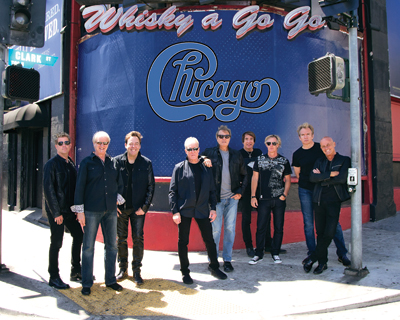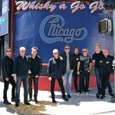
We write often in our pages about the tough choices faced by talented musicians trying to pick a career path. For every musician who achieves fame as a performer, there are countless others who make a big difference in relative obscurity. This story is the exception, the tale of college musicians who took their shot at stardom and are still following their dream five decades later. Their name is Chicago.
In an excellent new documentary, Now More Than Ever: The History of Chicago, the band members discuss their beginnings as DePaul college students through their overdue induction into the Rock and Roll Hall of Fame in 2016. In the early days, playing gigs in Chicago clubs in the late 1960s, their success was far from certain. While many nascent groups filled out their sets with cover songs, Chicago relied on original material, to the consternation of club owners. Unlike some groups with a clear leader, Chicago billed itself as a musical democracy. Most of the members contributed songs, and there was no lead singer. One of their greatest strengths was the killer horn section of trombonist James Pankow, trumpet Lee Loughnane, and sax Walter Parazaider.
The band eventually moved to Southern California to work with the producer of another horn-based band, Blood, Sweat & Tears. Once in California, the group played the legendary venues of the era including the Fillmore West and the Whiskey a Go Go. One night, Walt Parazaider felt a tap on the shoulder and turned to see Jimi Hendrix. The legendary guitarist praised Chicago’s Terry Kath as better than him and described the horns as “one set of lungs.” Hendrix also warned that Chicago would one day feel the pressures of fame even more than he had. Only years later would the band discover what he meant.
The next several years were a giddy ride to stardom as the group released hits that would become part of the soundtrack of the 1970s. Signed to Columbia Records by Clive Davis, the group released an album a year with Terry Kath’s muscular singing and guitar as the driving force for the group. Parazaider recalls that the group was so nervous during their first recording session that no one made eye contact for fear of making a mistake. Trumpet Lee Loughnane suffered periodic lapses in confidence and felt that he didn’t belong.
Once their fame was established, the group indulged in the vices typical of other rock stars of the era. Loughnane notes that today there would be a TMZ reporter documenting every mistake. When Kath died in a gun accident in 1978, the band faced an uncertain future without an essential member. Record sales dropped after Kath’s death. The well of hit songs went dry as the band drifted through the disco era without a clear musical direction. Eventually, Columbia Records dropped Chicago from its roster.
The group took a lump sum to leave Columbia and searched for its next opportunity. Irving Azoff, the manager of the Eagles, signed the group to his Full Moon label. The band looked to producer David Foster to help them create a hit record. The band was reborn as kings of the power ballad and promptly scored a #1 hit with Hard to Say I’m Sorry. Once prominent horn parts were often eliminated or buried under heavy production. Some members were uncomfortable with the abandonment of their rock roots, but the band was desperate for renewed success.
One member who liked the new direction was bassist and singer Peter Cetera. An original member of the band, Cetera sometimes seemed overshadowed by his bandmates. Cetera found a strong musical partner in Foster, and his distinctive tenor voice thrived in the group’s new sound. Cetera sought a great share of the money and a larger role in band decisions. Cetera left the group in 1985 for a successful solo career. As one member noted years later, “we’re all replaceable.” The band returned to its rock-based approach with the horns regaining a central role. The band remains perpetually on tour and entertains three generations of fans.
I first came to love Chicago during the power ballad era. Although FM radio showcased much cheesy music during this period, the 1980s were also the high point for classic rock stations. I heard the early songs that made Chicago famous. In the summer of 1985, a kid in my cabin at Blue Lake Fine Arts Camp arrived with a dozen Chicago cassettes in his bag. I was hooked. A few years later, I helped prepare questions for a Flute Talk interview with Walt Parazaider. The band sent me a couple of their rare vinyl albums to complete my collection and a backstage pass for an upcoming show near Chicago. My college roommate promptly lost my records; my father wouldn’t let me use my backstage pass. The life of a teenager is rough sometimes.
Chicago made sure that their music has endured. Through a combination of talent, determination, and dedication to their fans, the band has produced a legacy matched by few in the rock era with more than 100 million records sold. Their shot at stardom continues to hit its mark.





